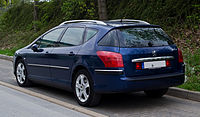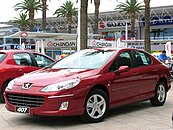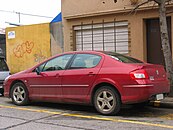Peugeot 407
This article may require copy editing for grammar, style, cohesion, tone, or spelling. (October 2023) |
This article needs additional citations for verification. (May 2008) |
| Peugeot 407 | |
|---|---|
 Pre-facelift Peugeot 407 | |
| Overview | |
| Manufacturer | Peugeot |
| Model code |
|
| Production | 2004–2011 2005–2011 (coupé) |
| Assembly |
|
| Designer | Dominique Leonard |
| Body and chassis | |
| Class | Large family car (D) |
| Body style |
|
| Layout | Front-engine, front-wheel-drive |
| Platform | PSA PF3 platform |
| Related | |
| Powertrain | |
| Engine | |
| Transmission | 5-speed manual 6-speed manual 4-speed PSA - Renault automatic 6-speed Aramox AF40/Aisin TF80SC automatic |
| Dimensions | |
| Wheelbase | 2,725 mm (107.3 in) |
| Length |
|
| Width |
|
| Height |
|
| Kerb weight | 1,475–1,799 kg (3,251.8–3,966.1 lb) |
| Chronology | |
| Predecessor | Peugeot 406 |
| Successor | Peugeot 508 |
The Peugeot 407 is a large family car (D-segment) produced by the French automaker Peugeot from 2004 to 2011. It was available in saloon, coupé and estate variants, with both diesel and petrol engines. The petrol engines range from 1.8 to 3.0 liters displacement, whereas the diesel engines range from 1.6 to 3.0-liter engines.
Sales commenced in June 2004, in France, with the rest of Europe sales commencing the following month.[1] According to the website of the European Car of the Year, the 407 was one of the nominees for the award, in 2005.[2]
The 407 was introduced in June 2004 as a replacement to the Peugeot 406 and was replaced in April 2011 by the Peugeot 508. The last Peugeot 407 was produced on 5 July 2011,[3] with the coupé model remained in production until December 2011.[4]
Overview
[edit]The 407 was the successor to the hugely successful Peugeot 406, and was launched in The Sunday Times Motorshow Live, on May 27, 2004.[5] The streamlined design of the car was seen as quite radical by magazines, such as Autocar, its most distinctive features being its large front grille, and the steeply raked screen pillars.[6]
Autocar also published undisguised spy photos, on three occasions throughout 2003, and commented the rear window line of the saloon had "the similar feel to the short wheelbase of the Ferrari 250."[7] The car was first announced, and presented to the press in Paris, in February 2004, and Groupe PSA (then known as PSA Peugeot Citroën) invested in €1.12 billion, in launching the car.[8][9]
The estate, known as the Peugeot 407 SW, was launched four months after the saloon event, in September 2004.[10] The coupé was launched in July 2005, having been presented at the Frankfurt Motor Show of September 2005, and going on sale in January 2006.[11] The annual sales of the Peugeot 407 peaked at 259,000 units in 2005, with 57,000 sales outside Europe. The coupé production ended in March 2012.[12]
The models were given a minor facelift in August 2008, resulting in most petrol engine models being withdrawn from sale in the United Kingdom, and other European countries. One model was available with AMVAR electronic suspension that controls each wheel's damping independently, adapting the hardness of the ride every 2.5 milliseconds, to suit the driving style.[13]
The 407, both in sedan and coupe versions, received 5 out of 5 stars in EuroNCAP tests.[14]
Design
[edit]The design of the car is very curved, which brings the design of the 407 more in line with the smaller Peugeot 307's looks. Its "face" features have angry-looking eyes and a big mouth. These changes from the more conservative looks of previous models have both its fans and critics.
The pre-facelift saloon model has a 0.29 drag coefficient.[15]
-
Sedan (pre-facelift) front view
-
Sedan (pre-facelift) rear view
-
Coupé
-
SW (pre facelift)
-
SW (pre facelift)
-
Sedan (facelift)
-
Sedan (facelift)
-
SW (facelift)
Safety
[edit]| Test | Score | Rating |
|---|---|---|
| Adult occupant: | 34 | |
| Child occupant: | 39 | |
| Pedestrian: | 15 |
| Test | Score | Rating |
|---|---|---|
| Adult occupant: | 35 | |
| Child occupant: | 42 | |
| Pedestrian: | 15 |
Engines
[edit]All engines have DOHC and four valves per cylinder. All petrol engines have multi-point fuel injection. All diesels have common rail direct injection
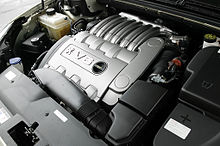
| Model | Engine type | Displacement Cylinders | Max. power at rpm | Max. torque at rpm | 0–100 km/h (0-62 mph) | Vmax | Years | ||
|---|---|---|---|---|---|---|---|---|---|
| Petrol Engines | |||||||||
| 1.8 | EW7 J4 (6FZ) | 1,749 cc I4 | 118 PS (87 kW; 116 hp) @ 5,500 rpm | 163 N⋅m (120 lb⋅ft) @ 4,500 rpm | 11.3 s | 200 km/h (124 mph) | 2004–2005 | ||
| 1.8 | EW7 (6FY) | 1,749 cc I4 | 125 PS (92 kW; 123 hp) @ 6,000 rpm | 170 N⋅m (125 lb⋅ft) @ 3,750 rpm | 10.3 s | 203 km/h (126 mph) | 2005–2010 | ||
| 2.0 | EW10 J4 (RFN) | 1,997 cc I4 | 136 PS (100 kW; 134 hp) @ 6,000 rpm | 190 N⋅m (140 lb⋅ft) @ 4,100 rpm | 10.3 s | 212 km/h (132 mph) | 2004–2005 | ||
| 2.0 | EW10 A (RFJ) | 1,997 cc I4 | 140 PS (103 kW; 138 hp) @ 6,000 rpm | 200 N⋅m (148 lb⋅ft) @ 4,000 rpm | 10.3 s | 213 km/h (132 mph) | 2005–2011 | ||
| 2.2 | EW12 J4 (3FZ) | 2,230 cc I4 | 158 PS (116 kW; 156 hp) @ 5,650 rpm | 217 N⋅m (160 lb⋅ft) @ 3,900 rpm | 9.0 s (Man) 10.7 (Auto) SW: 11.1 s (Auto)[18] | 220 km/h (137 mph) | 2004–2005 | ||
| 2.2 | EW12 J4 (3FY) | 2,230 cc I4 | 163 PS (120 kW; 161 hp) @ 5,875 rpm | 220 N⋅m (162 lb⋅ft) @ 4,150 rpm | 10.1 s | 222 km/h (138 mph) | 2005–2009 | ||
| 3.0 | ES9 A (XFV) | 2,946 cc V6 | 211 PS (155 kW; 208 hp) @ 6,000 rpm | 290 N⋅m (214 lb⋅ft) @ 3,750 rpm | 8.7 s (Auto)[18] | 235 km/h (146 mph) | 2004–2009 | ||
| Diesel Engines | |||||||||
| 1.6 HDi | DV6 TED4 (9HY/9HZ) | 1,560 cc I4 | 109 PS (80 kW; 108 hp) @ 4,000 rpm | 240 N⋅m (177 lb⋅ft) @ 1,750 rpm | 13.1 s | 192 km/h (119 mph) | 2004–2010 | ||
| 2.0 HDi | DW10 BTED4 (RHR) | 1,997 cc I4 | 136 PS (100 kW; 134 hp) @ 4,000 rpm | 320 N⋅m (236 lb⋅ft) @ 2,000 rpm | 9.8 s (Man) 10.7 (Auto) SW: 11.2s (Auto)[18] | 208 km/h (129 mph) | 2004–2009 | ||
| 2.0 HDi | DW10 BTED4 (RHF) | 1,997 cc I4 | 140 PS (103 kW; 138 hp) @ 4,000 rpm | 320 N⋅m (236 lb⋅ft) @ 2,000 rpm | 9.8 s | 208 km/h (129 mph) | 2008–2010 | ||
| 2.0 HDi | DW10 CTED4 (RHH) | 1,997 cc I4 | 163 PS (120 kW; 161 hp) @ 3,750 rpm | 340 N⋅m (251 lb⋅ft) @ 2,000–3,000 rpm | 9.6 s | 210 km/h (130 mph) | 2009–2011 | ||
| 2.2 HDi | DW12 BTED4 (4HT) | 2,179 cc I4 | 170 PS (125 kW; 168 hp) @ 4,000 rpm | 370 N⋅m (273 lb⋅ft) @ 1,500 rpm | 8.7 s | 225 km/h (140 mph) | 2006–2010 | ||
| 2.7 HDi | DT17 TED4 (UHZ) | 2,720 cc V6 | 204 PS (150 kW; 201 hp) @ 4,000 rpm | 440 N⋅m (325 lb⋅ft) @ 1,900 rpm | 8.5 s | 230 km/h (143 mph) | 2006–2009 | ||
| 3.0 HDi | DT20 C | 2,993 cc V6 | 241 PS (177 kW; 238 hp) @ 3,800 rpm | 450 N⋅m (332 lb⋅ft) @ 1,600 rpm | 7.9 s | 245 km/h (152 mph) | 2009–2011 | ||
Television commercials
[edit]The first advertisement, known as "The Toys" or "Les Jouets", featured life-size toy cars shown up, by the sleek newly released Peugeot 407. Directed by Philippe André, for agency BETC Euro RSCG, the advert was filmed in Sydney, Australia (we see cars crossing the Sydney Harbour Bridge). André developed twenty model cars, especially for the shoot. This campaign was launched in June 2004.[19]
The soundtrack was provided by French duo, The Film, (Guillaume Brière & Benjamin Lebeau) with their song "Can You Touch Me", an adaptation of their earlier song, "Can You Trust Me".
The next advertisement featured the same scenario of life-size toy cars in Sydney, this time taking a new Peugeot 407 SW out of the city, to the beachside home. Along the way, we see old and decrepit station wagons breaking down, or suffering from image problems. The soundtrack features "(Lady) Hear Me Tonight" by the Modjo. The commercials used the slogan "Playtime is Over", which some perceived to be the retort, to the then slogan of Renault's Laguna, "Serious Playtime", which was launched in August 2002.[20]
The slogan given at the end in Spanish was "Volvamos a hablar de automóviles", i.e. "Let's talk about cars again".
407 concept cars
[edit]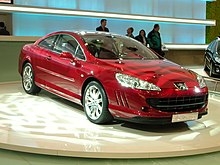

The saloon version of the 407 was first previewed, with the name "407 Elixir", at the 2003 Frankfurt Motor Show. The "407 Silhouette" is a race car, with most design features of the current coupé. A version, almost identical, to the released coupé, was presented at the 2005 Geneva Motor Show, under the name "407 Prologue". The "407 Macarena" is the four-door coupé convertible, produced by Heuliez, and was presented at the 2006 Geneva Motor Show.
Notable film appearances
[edit]The 407 sedan appeared in the comedy film Taxi 4 of 2007, and the film Taxi 5, of 2018, unlike the previous films (1, 2 and 3) which had its predecessor (the 406).[21]
Successor
[edit]Philippe Varin, from PSA, announced in November 2010 that the successor of the Peugeot 407 would not be called the Peugeot 408, but instead the Peugeot 508, which was officially launched at the Paris Motor Show, in October 2010.[22]
The saloon of the 508 was approximately 12 cm (5 inches) longer than the 407, and also replaced the larger Peugeot 607.[23] The name Peugeot 408 was used for the Chinese built notchback version of the Peugeot 308, that replaced the 407 in South America.
Model car releases
[edit]The saloon of the Peugeot 407 has been produced by Majorette and Norev, while the SW was only produced by Norev.
The coupé has been produced by Norev and Welly, and the concept "407 Elixr", which was presented in the 2003 Frankfurt Motor Show, has been produced only by Norev.
Sales
[edit]| Year | Worldwide Production | Worldwide sales | Notes |
|---|---|---|---|
| 2004 | 170,000 | 170,000[24] | |
| 2005 | 271,000 | 268,000[24] | |
| 2006 | 197,700 | 194,800[24] | |
| 2007 | 162,000 | 158,000[24] | |
| 2008 | 117,700 | 113,400[24] | |
| 2009 | 96,500[25] | 90,800[24] | |
| 2010 | 84,900[25] | 79,300[25] | |
| 2011 | 9,348[26] | 4,605[26] | Total 407 production reaches 1.109.148 units.[26] |
References
[edit]- ^ "What price progress?". telegraph.co.uk. 24 April 2004. Retrieved 15 September 2020.
- ^ "Car Of The Year 2005 Nominees". caroftheyear.org. 15 November 2004. Retrieved 15 September 2020.
- ^ "Peugeot 508 HDi GT". autocar.co.uk. 17 January 2011. Retrieved 15 September 2020.
- ^ "Peugeot 407 Coupe Laquelle choisir ?". www.largus.fr. Retrieved 2024-05-12.
- ^ "Peugeot At The Sunday Times Motor Show Live 2004". May 12, 2004. Retrieved August 4, 2016.
- ^ "Peugeot 407 2.0 HDi". autocar.co.uk. 20 April 2004. Retrieved 15 September 2020.
- ^ "407 majors on style". autocar.co.uk. 11 December 2003. Retrieved 23 September 2020.
- ^ "Peugeot 407". www.fleetnews.co.uk. 11 December 2003. Retrieved 15 September 2020.
- ^ "PSA invests 1.12 billion euros in Peugeot 407". autonews.com. 8 December 2003. Retrieved 15 September 2020.
- ^ "THE PEUGEOT 407 SW - ON SALE SEPTEMBER 2004". carpages.co.uk. 2 September 2004. Retrieved 15 September 2020.
- ^ "Peugeot 407 Coupé revealed". autocar.co.uk. 30 July 2005. Retrieved 15 September 2020.
- ^ "Peugeot 407 Coupe (2005 - 2011)". www.rac.co.uk. 8 July 2010. Retrieved 15 September 2020.
- ^ "Archived copy" (PDF). Archived from the original (PDF) on 2016-09-10. Retrieved 2016-04-28.
{{cite web}}: CS1 maint: archived copy as title (link) - ^ "For safer cars | Peugeot 407". Euro NCAP.
- ^ Peugeot Direction de la Communication (December 2003). "Peugeot 407". IAE Perpignan. Retrieved 12 May 2024.
- ^ "Peugeot 407 Saloon". euroncap.com. 2004.
- ^ "Peugeot 407 Coupe". euroncap.com. 2005.
- ^ a b c "Peugeot 407". 2004.
- ^ "World: Analysis - Peugeot rises to challenge of running 'toys' in all territories". campaignlive.co.uk. 11 June 2004. Retrieved 15 September 2020.
- ^ "Renault launches Laguna model with integrated media campaign". campaignlive.co.uk. 16 August 2002. Retrieved 15 September 2020.
- ^ "Taxi 5 Is France's Answer To Fast & Furious". carbuzz.com. 4 February 2018. Retrieved 15 September 2020.
- ^ "Peugeot 508 sedan and SW for early 2011". 14 September 2010.
- ^ "The Peugeot 508 | Strong design at the heart of emotion" (PDF). www.peugeot.com. Peugeot. 12 July 2010. Archived from the original (PDF) on 2011-09-30. Retrieved 1 October 2010.
- ^ a b c d e f "PSA". Psa-peugeot-citroen.com. 2011-01-13. Archived from the original on 2010-12-06. Retrieved 2011-01-29.
- ^ a b c "Engine specs from PSA Peugeot Citroën" (PDF). Creator and designer. PSA Peugeot Citroën. Archived from the original (PDF) on 5 June 2017. Retrieved 26 November 2012.
- ^ a b c "PSA Annual Report 2012" (PDF). Car manufacturers. PSA. Retrieved 5 April 2013.[permanent dead link]





